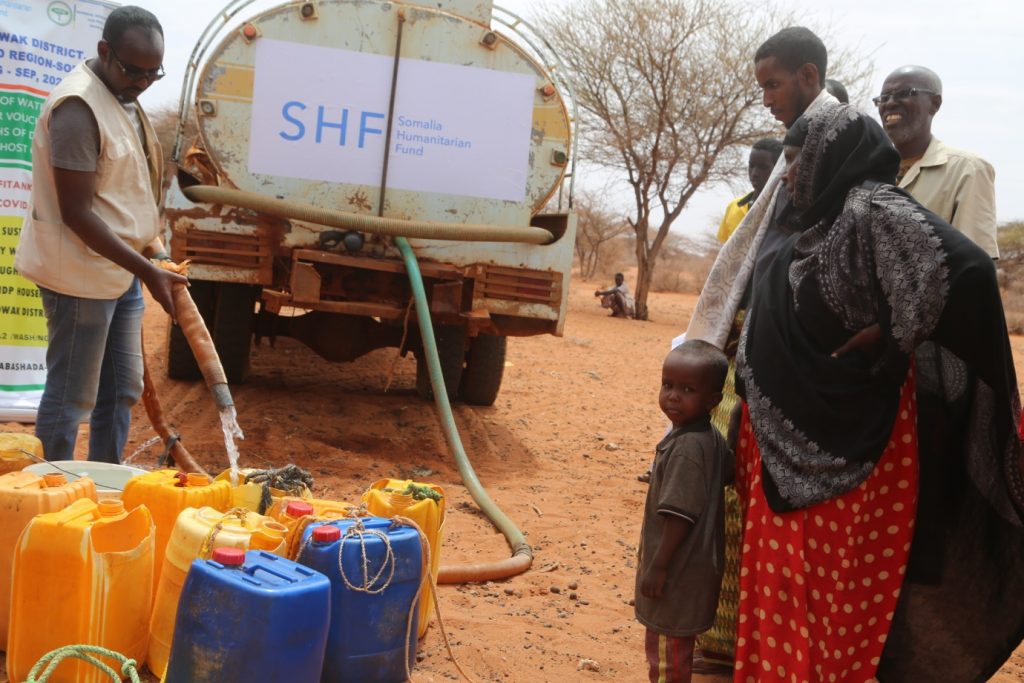Drought in Somalia
According to the UNOCHA Regional Humanitarian Report of August 2022, more than 7.8 million people in Somalia have been affected by drought with more than 1.1M leaving their homes in search of food, water, pasture, and alternative sources of livelihood. This is heightening pressure on the already scarce basic services and raising the possibility of intercommunal conflict.
After four consecutive failed rainy seasons both humans and livestock are experiencing severe water shortages. The UNOCHA also reports that 6.4 million people do not have access to safe water and sanitation which makes them more vulnerable to disease outbreaks particularly acute watery diarrhoea and cholera. Women and girls are now walking longer distances to access water which is exposing them to sexual or gender-based violence and forcing the girls to drop out of school.
In Galgadud region, people and livestock have relied on rain water and communal boreholes as their primary sources of water. The rainwater is collected in communally owned berkads (traditional water reservoirs) which provided them with water for a short period of time before it run out. However, these water reservoirs have dried up after the failed rainy seasons. The communal boreholes are also facing different challenges such as generator powered water pumping system breakdowns. This has forced communities in this region to look for other alternatives to access water. Some of the alternatives include trekking to the neighbouring villages where water is at times contaminated by animals or buy from commercial water vendors who sell the water at very high prices.
Emergency drought response through provision of emergency water
Nomadic Assistance for Peace and Development (NAPAD) with funding from Somalia Humanitarian Fund (SHF) is supporting vulnerable populations in drought-affected rural villages and IDP settings in Abudwak District, Galgadud region, Somalia, with emergency water through water vouchers. For the past 2 months, the water vouchers have allowed 7800 persons from rural communities in Miiragalwac, Laasole, Galmaygaag, Daarasalam, Bilcil, Hawraarsame villages to access clean water through water trucking.
The use of water vouchers for water supply from local water vendors is a short term emergency response to provide lifesaving clean water for consumption, cooking, domestic hygiene requirements, reducing risk of water borne diseases and preventing death due to dehydration.
The project has also been supporting these communities with hygiene promotion outreaches where community health hygiene promoters educate the community members on hygiene practices including proper hand washing practices, safe water storage and environmental hygiene.

Improving access to clean water for Mama Hawo Abdi
Mama Hawo Abdi from Galmaygag village is one of the beneficiaries who have access to clean and safe water through this project. She is a mother to 9 children and the sole breadwinner of her family. Her household has depended on water vendors locally known as Booyads to provide her with clean water. However, because of the drought there is water scarcity which has led to increased water prices. There has also been an increased demand of water from other settlements. This made it difficult for her and other vulnerable households in her village to purchase water.
“In a week, only one water boozer came to the village and it cost us up to $50. Most days I could not afford to contribute my share of the money which forced me to use contaminated water.” Reported Hawo
The provision of water vouchers has enabled Hawo and her children to access clean water for cooking and drinking and also water for other domestic uses such as washing hands, bathing and for cleaning. Hawo also utilizes the money she previously used to pay for water to purchase food for her children.
“We are really grateful to NAPAD for their timely intervention,” Appreciated Mama Hawa
Many households in Somalia and the Horn of Africa continue to be in desperate need of water as they face a fifth consecutive failed rainy season. NAPAD requires more funding in order to provide lifesaving water to drought affected communities as well as establish more sustainable solar powered water supply infrastructures to rural communities in the Horn of Africa.
